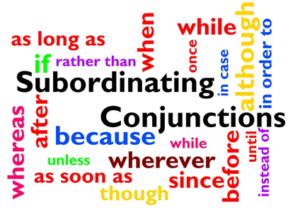Conjunctions are linking or joining words that connect other words and phrases together. So there are some very important uses of conjunctions in English grammar. Let us take a look at the types and use of conjunctions.
Suggested Videos
Conjunctions
They are of three types and each of these types joins different types or parts of the sentence:
- Coordinating Conjunctions link equal parts of a sentence including clauses and phrases. A comma is used when two a coordinating conjunction is used to join two independent clauses.
- Subordinating Conjunctions help to link or connect a dependent clause to an independent one. The commonly seen relationship between the two clauses is cause- and- effect or contrast but it can be any other type as well.
- Correlative Conjunctions are paired conjunctions that are generally used together.
The main job of conjunctions it to link words, clauses or phrases into one complex and interesting sentence. Let us now look at the list of conjunctions commonly used and their usage and meaning.
Conjunctions: Definitions, Types, and Examples

Types and Use of Conjunctions
Here is the use of conjunctions with respect to their types:
Coordinating Conjunctions
The most commonly used coordinating conjunctions are easily remembered by the pneumonic FANBOYS: For, And, Nor, But, Or, Yet, So.
- For- It explains reason or sights purpose.
- And- It helps to add one clause or phrase to another similar one.
- Nor- It is used to add a negative idea to an already existing negative idea.
- But- Helps to show a contrast.
- Or- Helps to add an alternative to an already existing positive alternative.
- Yet- Provides a contrasting idea to an existing logical idea or point.
- So-It is used to indicate or show a result or consequence of an event.
Few sentences using the above conjunctions:
- She couldn’t make it to the meeting, so I had to take over.
- I love ice- cream but due to the flu, I couldn’t have it.
- Would you like rice or noodles with your Chinese gravy?
- I don’t like apples nor do I like pears.
- My sister and I look alike.
Browse more Topics under Conjunction
- Introduction to Conjunctions
- Coordinating Conjunction
- Paired or Correlative and Compound Conjunctions
- Subordinating Conjunction
What is Coordinating Conjunction?
Subordinating Conjunctions
The commonly used subordinating conjunctions are because, once, though, until, when, since, where, while, although. These show relation in time, place or condition. Few sentences using the above conjunctions:
- I took an umbrella because it was raining.
- Although she was disabled, she was involved in many social service campaigns.
- He was working very hard while his wife was recovering at home.
- Though they were not very rich, they made yearly donations for the betterment of society.
- Ever since she left her job, she has been actively taking care of her children at home.
What are Subordinating Conjunctions ?
Correlative Conjunctions
As mentioned earlier, correlative conjunctions exist in pairs. Examples of correlative conjunction pairs is neither/nor, either/or, not only/but also to name a few. Few sentences using the above conjunctions:
- Either he or she cooks dinner.
- I have neither tea nor coffee.
- He is not only intelligent, but also very funny.
- Would you rather go shopping or spend the day at the beach?
Conclusions can be used in the beginning and in the middle of a sentence. Subordinating conjunctions can begin a sentence if the dependent clause comes before the independent clause in it. Commas are often used along with conjunctions where they help separate two independent clauses.
Solved Example for You
Q: She is neither rich _ educated.
- either
- or
- nor
- but
Sol. (c) nor. The sentence is given needs correlative conjunction to fill in the blank. The word that is already given in the sentence i.e ‘neither’ is a clue. Since correlative conjunctions always exist in pairs, the option to fill in the blank is option c) nor which is the pair for neither.






What is appropriate conjunction
kindly help put in the right conjunction in the following sentences. thanks.
1. newton was busy. He did not notice the food on the table. He did not even remember that he was hungry.
So, but
So and but is a coordinating conjunctions
They are single words that join similar words or phrases or elements
Not,was,on
Newton was so busy that he neither notice the food on the table nor even remember that he was hungry
How can I join. I’m in Nigeria Africa
How can I join I am a Nigerian
omoyeni temiloluwa
What is conjunctivits
Can you please fill in this one.
I will keep the secret……… if he begs me to tell him.
I will keep the secret only if he begs me to tell him.
Pls how can I join I am a Nigerian
Hw can I join o
I am a Nigerian
I need replies o
What is the example of coordinating conjunctions
Or, yet are coordinate conjunction
as if is correlative yes or no?
Thanks ……..
I am not entusiastic ________skiing, but I don’t mind spending a few days at an Uludag resort hotel.
Of
At
On
About